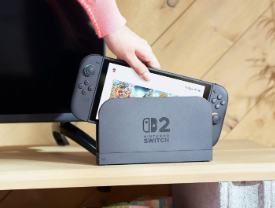For over four decades, Nintendo has been the go-to name for many gamers of all ages. Unlike Sony or Microsoft, Nintendo has always been known for its games’ accessibility, not for their cutting-edge performance. They’ve always held a special place in the gaming community’s hearts for their colorful, childhood-shaping titles.
However, recently the company has come under heavy criticism pertaining to their latest release: the Nintendo Switch 2. With a launch price of $500 and the announcement that hard copies of first-party games will climb to $90—a huge jump from the previous industry standard of $60—it’s no surprise why gamers are hesitant to press buy.
During the pandemic, many people tried gaming for the first time because it was affordable. Now, Nintendo is asking consumers to gamble nearly $600 on a console and one game, with zero guarantee that they’ll even enjoy their purchase.
But the price difference hasn’t just scared away newcomers; even long-time Nintendo fans are shying away from the Switch 2, unsure if they’re willing to make a $600 investment to catch up with the icons of their childhood. People who grew up playing Mario are wondering if the price tag is worth it for glorified nostalgia.
It’s not only the price that has fans worrying, though. The Switch 2, being a handheld system, has considerably poorer performance than its competitors. When in handheld mode, the Switch 2 has 1.7 teraflops of processing power, compared to the PlayStation 5’s 10.28 teraflops—meaning a nearly five-year-old console (practically ancient in technology years) is almost ten times more powerful than the Switch 2, yet costs the same.
Tragically, the issues plaguing the Switch 2 don’t end there. Nintendo’s harsh no-refund policy is majorly off-putting to new gamers. Unlike Steam or Sony, if you drop $90 on a title that disappoints you, you’re stuck with it.
Their opinion on refunds goes hand in hand with the newest rule on their console: your games are their games. Most Switch 2 games (especially if purchased digitally via the Nintendo eShop) are technically licenses tied to your Nintendo account, not products you own. If Nintendo were to pull a game from the eShop, your access would vanish with it—even if you paid full price.
But Nintendo can take away more than just your games. If the company deems your gaming activity to break its Terms of Service (whether it be modding, suspicion of piracy, or even minor breaches), your account will be banned and your Switch 2 becomes a $500 brick.
All of these concerns have culminated in protests throughout Nintendo chatrooms, with fans vowing to boycott the Switch 2. Consumers continued commanding Nintendo to lower the price, but much to the dismay of the Switch 2’s critics, Nintendo sold 3.5 million units in just four days, making history as the fastest-selling Nintendo console ever.
The staggering sales of the Switch 2 raise alarming questions about the future of the gaming industry. Nintendo proved that people will pay luxury prices for mid-tier performance, and if history is any guide, the rest of the industry will soon follow suit.
What the Switch once was: a family-oriented household item, accessible to nearly anyone with a few hundred dollars to spare—is quickly transforming into an extravagant market.
If this trend continues, the gaming industry could see a permanent shift in its consumer base: a future where $90 becomes the new “baseline” price for standard games, with “special editions” slowly creeping their way into the triple digits.
While the notion of a game costing more than $100 may sound absurd, those closely following the gaming scene have already seen it happen. Star Wars: Outlaws Ultimate Edition is priced at $129.99, indicating that further increases are entirely possible.
If players keep purchasing without question, we’re not just accepting higher prices—we’re helping to build a gated gaming community. A community where if you aren’t wealthy enough, it’ll leave you in the dust.
Nintendo’s release of the Switch 2 might feel insignificant, but it’s just the first domino. If we don’t take this as a warning, step back, and reflect on our actions, the next generation of gaming won’t be about innovation, creativity, or fun. It will be about who can afford to play at all.








